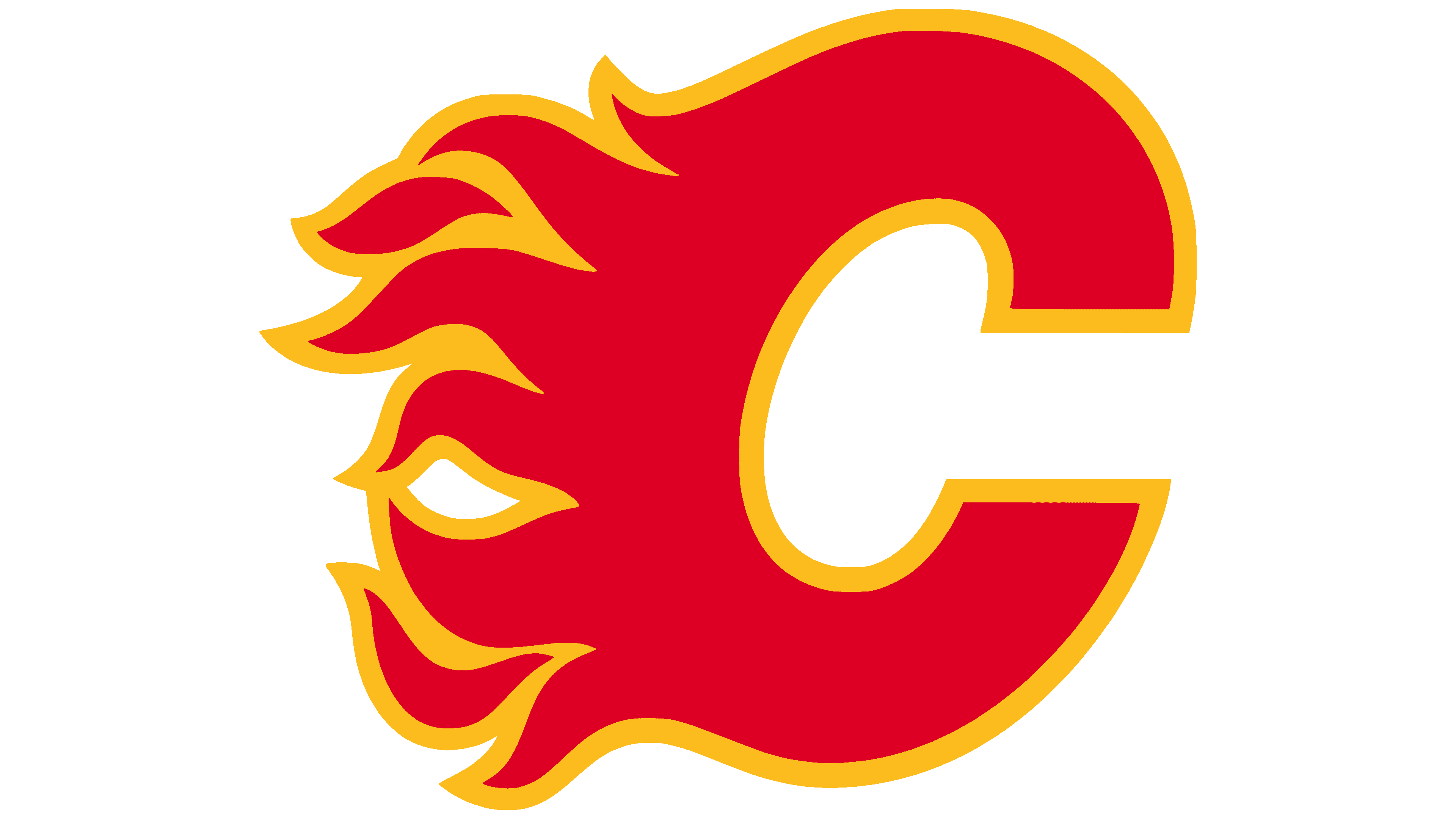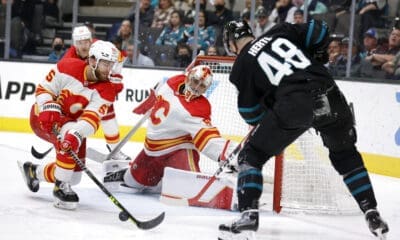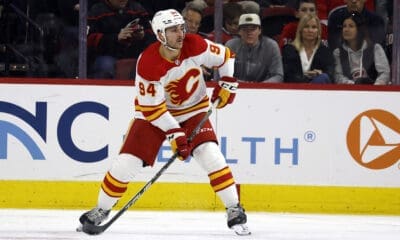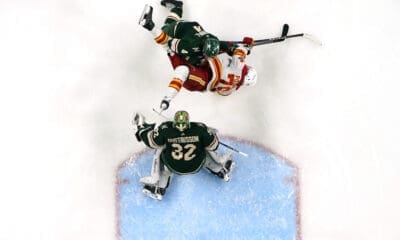Calgary Flames
The UK EIHL Year In Review: Former Flames and Calgarians lead the way
Ex-players and Calgary-based businessmen featured heavily in this year's Elite League championship shakeup.

This year's Elite Ice Hockey League has been full of headlines, for good reasons and bad. This year, over here in the UK we have seen a team have no home arena for a month after the ice plant failed two weeks before the start of the season, teams attempt to sign ex-NHLers (one successfully, the other not so much), a player banned for 18 games for spearing somebody and throwing his helmet at him (with viral video to boot), and the entire UK hockey community uniting over one girl's battle against cancer.
On the ice, there were twists and turns every single week. You were never entirely convinced that any one team wanted to win the league, and it took until the final weekend to determine where the Monteith Bowl was heading.
Several people with links to Calgary, be they former players, prospects or residents were involved in the title battle.
A Brief Description
There are 10 teams in the EIHL. These 10 are split into two conferences. Belfast Giants, Cardiff Devils, Coventry Blaze, Nottingham Panthers and Sheffield Steelers make up the Erhardt Conference; while Braehead Clan, Dundee Stars, Edinburgh Capitals, Fife Flyers and Hull Stingrays make up the Gardiner. Each team plays their conference opponents eight times over a season (four home, four away) and the teams from the opposite conference four times (two home, two away).
The regular season championship is the biggest prize in the UK game. The 52 games each team plays aim towards winning that, with the final standings an overall table of the 10 teams. The conferences are used to determine playoff seedings. The playoffs themselves are a much smaller concern than in North America, with the entire post-season taking two weeks to complete.
The teams also contend for another trophy, the Challenge Cup. The teams are split into two slightly different groups, and hold a round robin to determine qualifiers for the next round. The qualifiers then merge and face each other, usually on seedings from the previous round but it has been known for a draw to take place. The subsequent rounds are played over two legs, before a single leg final match – a new introduction for this past season. Think UEFA Champions League soccer format.
As for the game itself, I find the best comparison is that the EIHL is to the NHL, what the MLS is to the English Premier League. You often find players who never lived up to their potential, or have come over to prove themselves, or have come for a final paycheque to see out their careers. Several EIHL clubs also offer combined university deals, so you get several players come over to get an education for their post-hockey career. You also find the best homegrown talent, in a similar way to the MLS where the best US or Canadian internationals stay at home and become superstars.
The Elite League Championship
This year, the EIHL title looked like it was going to be a one-horse race, for about three different teams. The Sheffield Steelers led the early season charge, before becoming a bit unstuck come November. Cue the emergence of the Braehead Clan, a relatively new club in their fifth year that was having its first real charge at winning Elite League silverwear. Then, when they stuttered in January, the Cardiff Devils seemed to take charge and looked destined for the Monteith Bowl. But then they faltered. The remaining six weeks of the league was full of more twists and turns than a giant roller coaster. You could make justifiable claims for four or five teams to take the trophy at the end of the year.
As it was, it went down to the last weekend. After defeating their arch-rivals in Nottingham the night before via a late overtime winner, the Sheffield Steelers – including 2005 third round Flames pick Gord Baldwin, and Rod “brother of Cory” Sarich in their defensive core, as well as playing 2006 seventh round pick Devin DiDiomete as injury cover earlier in the year – clinched the title by defeating Cardiff 2-1 on Saturday night to claim their first EIHL championship since 2010-11, when they won the title by virtue of having more regulation wins than the Devils.
The Steelers won the league by a point to the Braehead Clan, coached by former Steeler Ryan Finnerty and featuring former Flame Stefan Meyer. Quick note – with 31+37 in 55 games, as of writing Meyer was the highest scoring active former Flame this season anywhere in the world. At several points through the season the Clan could and should have seen the league title out, but a mixture of naivity and pressure saw them lose their grasp and have to settle for a place in next season's Champions Hockey League instead.
Along with second place, the Clan also won the Gardiner Conference, but the Steelers did not win the Erhardt to go with their league title. That honour went to the Nottingham Panthers, who were it not for an injury-hit season would have been title contenders for sure.
Other Flames interest throughout the league included 2006 sixth round pick Jordan Fulton, who had another year as a key part of the Fife Flyers organisation, and a certain Kevin Westgarth. Belfast secured the signing of Westgarth in late October, and he was touted by many as a superstar, a former Stanley Cup winner, and somebody who was going to help Belfast retain the title they won in 2013/14. In truth, he never showed up, and his performances left a bitter taste in many Giants’ fans mouths.
Challenge Cup
Last year was a tough one for the Cardiff Devils. A change of coach, poor form on the ice, and tales of mismanagement and poor ownership off it didn't help. A month before the season was due to start, barely any players had been signed and fans were bracing themselves for the worst. Luckily for them, a white knight rode in – or rather, several white knights.
Todd Kelman had been the general manager of the Belfast Giants, but he himself said he had become bored of running a well-oiled, successful machine. He wanted a new challenge, and he saw that in Cardiff. A Calgary native, he made a few phone calls, and together with a consortium of four other Calgarians bought the Devils. Now, less than 12 months later, the club has been selling out their temporary rink (lovingly dubbed the Big Blue Tent), are about to move into a new publicly funded permanent home, appear to be run on a sound financial basis, and have a trophy to add to their collection.
Their 2-1 win over the Sheffield Steelers, in the Steelers' own home rink (selected earlier in the season as the venue for the final), was met with congratulations from all around the league, as fans from each team acknowledged what a difference a year makes. It was the Devils' first trophy since winning the British Knockout Cup in 2007, and it was the absolute least the Devils' supporters deserved after they so nearly went out of existence last year.
Playoffs
The playoffs haven't started yet, but in true British hockey fashion, its not as easy as following a bracket. We also don't have the North American playoff format. Instead, eight teams (more often than not the top eight in the league) contest the playoffs in a knockout format, with seeding determined on league and conference placings.
The quarter finals are two-legged affairs, with the winner being determined by aggregate score rather than games won. The winners of the clash all advance to Playoff Weekend, held annually at the National Ice Centre in Nottingham. In the semi-finals, the top remaining seed faces the lowest remaining seed, while the other two winners meet each other in single one-off games. The two winners then advance to a one-off final a day later, where the winner is crowned the Playoff Champions.
If you're interested in watching the EIHL playoffs, google "Premier Player". Premier Sports is the broadcaster of the EIHL and will be showing all three games from the finals weekend via their web platform that you should be able to access from anywhere in the world.
by Liam McCausland








